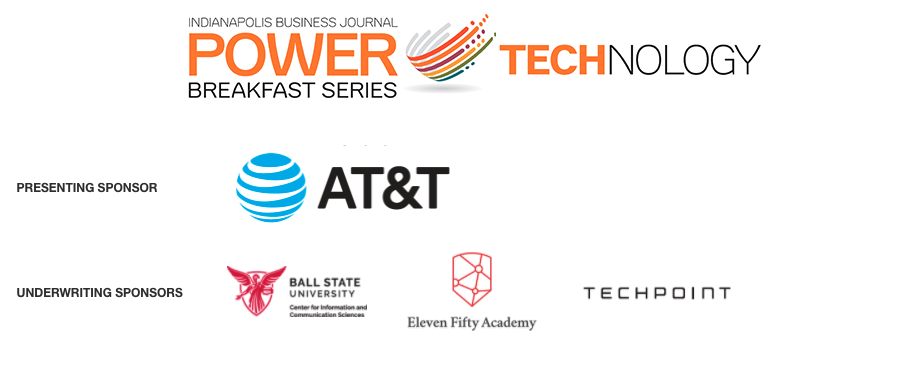The Indianapolis Business Journal hosted their Power Breakfast Series focused on Technology on Friday, February 18th, 2022.
Panelists were:
- Al Eisaian – Board Member at Intelinair
- Mike Langellier – CEO of TechPoint
- Joanna Milliken – CEO of Emarsys
- Bill Soards – President of AT&T Indiana
- Darrian Mikell – CEO and Co-Founder of Qualifi
- Megan Glover – CEO and Co-Founder of 120Water
Susan Orr from IBJ moderated the panel.
The conversation started with a discussion about remote and hybrid work. While all the companies have implemented more flexibility in their workplaces, the stage and size of the company impacted their current setup.
120Water started a few years before the pandemic and has a little less than 100 employees. About two-thirds of them work on a flexible schedule from a single office, and the other third work remotely. Emarsys is a global company founded 20+ years ago and has 750 employees. Most employees live near a hub office, but they have a hybrid approach.
Qualifi only started in 2019, and they are up to fifteen employees. They’ve embraced a fully distributed model to help them attract the right candidates. Darrian Mikell said that he originally viewed an office not so much as a centralized work hub, but as “a place to goof off” with coworkers. While the team wants to stick with their remote set up, they still want some planned social interactions and expect the company to create in-person moments.
Talent development is the biggest crack in remote work
While all the panelists praised more flexibility for workers, they made some great points about challenges that leaders will need to address. The one that stood out the most was talent development.
Mike Langellier said that employers are decreasing their investment into training while at the same time expecting to be able to do “just-in-time” hiring. Megan Glover thinks that on-the-job training is suffering.
Al focused on the need to develop talent and not just hire it. He said if everyone just steals the same people from each other, nobody wins. We need to find ways to build apprentice and internship models even in hybrid and remote setups. Remote-only companies tend to be highly skilled labor that doesn’t have talent development as an emphasis. “Who is providing the depth?” Al asked.
Megan added that, “Remote is an earned perk.” When you are at a mature stage in your career, remote is fantastic, but we need better ways to teach others who haven’t hit that stage yet. This can lead to a situation where local companies put in the investment to build people’s careers, but then they leave for higher-paid roles at companies with a remote-only culture.
Opportunities outside traditional tech hubs
Al has spent a significant part of his career in and around California. He said that Indiana has a lot of strengths for the new economy. There is a high quality of life, low cost of living, and people are generally nicer. But there are particular skills that are tough to find here, specifically go-to-market strategies and data science.
Mike talked about the change from a region offering perks and tax breaks to employers, to offering those perks to employees. The shift will change from “How do we attract companies?” to “How do we attract people?”
He also brought attention to the importance of civic involvement. When a locality has a big problem to solve, they usually ask for help from the companies that make up that ecosystem. Those companies are usually heavily invested in the local community and bring financial and people to solve the issue. If more companies shift to a remote model, that leaves a big hole for solving local problems.
Expect tech investment to continue
Mike pointed out that 2021 saw over $1 billion in VC investment into Indiana companies, nearly three times the previous high. He said to expect to see larger and larger investments due to the consolidation of a lot of VC funds.
Mike and Megan both agreed that Indianapolis needs to start looking to the next phase of development as a tech hub. It shouldn’t just celebrate when a company is acquired or gets a second round of funding. The goal should be to see some acquisitions and not just getting acquired.
Megan said we need to invest in people and talent to show that we can actually execute on these big bets.
Trends
Bill talked about the importance of 5G in the coming years. Many of the technology dreams won’t come to fruition without the widespread implementation of 5G. Joanna and Al both said that AI and automation is going to continue to play a major role in companies that move forward.
The Indianapolis Business Journal hosted their Power Breakfast Series focused on Technology on Friday, February 18th, 2022.
Panelists were:
- Al Eisaian – Board Member at Intelinair
- Mike Langellier – CEO of TechPoint
- Joanna Milliken – CEO of Emarsys
- Bill Soards – President of AT&T Indiana
- Darrian Mikell – CEO and Co-Founder of Qualifi
- Megan Glover – CEO and Co-Founder of 120Water
Susan Orr from IBJ moderated the panel.
The conversation started with a discussion about remote and hybrid work. While all the companies have implemented more flexibility in their workplaces, the stage and size of the company impacted their current setup.
120Water started a few years before the pandemic and has a little less than 100 employees. About two-thirds of them work on a flexible schedule from a single office, and the other third work remotely. Emarsys is a global company founded 20+ years ago and has 750 employees. Most employees live near a hub office, but they have a hybrid approach.
Qualifi only started in 2019, and they are up to fifteen employees. They’ve embraced a fully distributed model to help them attract the right candidates. Darrian Mikell said that he originally viewed an office not so much as a centralized work hub, but as “a place to goof off” with coworkers. While the team wants to stick with their remote set up, they still want some planned social interactions and expect the company to create in-person moments.
Talent development is the biggest crack in remote work
While all the panelists praised more flexibility for workers, they made some great points about challenges that leaders will need to address. The one that stood out the most was talent development.
Mike Langellier said that employers are decreasing their investment into training while at the same time expecting to be able to do “just-in-time” hiring. Megan Glover thinks that on-the-job training is suffering.
Al focused on the need to develop talent and not just hire it. He said if everyone just steals the same people from each other, nobody wins. We need to find ways to build apprentice and internship models even in hybrid and remote setups. Remote-only companies tend to be highly skilled labor that doesn’t have talent development as an emphasis. “Who is providing the depth?” Al asked.
Megan added that, “Remote is an earned perk.” When you are at a mature stage in your career, remote is fantastic, but we need better ways to teach others who haven’t hit that stage yet. This can lead to a situation where local companies put in the investment to build people’s careers, but then they leave for higher-paid roles at companies with a remote-only culture.
Opportunities outside traditional tech hubs
Al has spent a significant part of his career in and around California. He said that Indiana has a lot of strengths for the new economy. There is a high quality of life, low cost of living, and people are generally nicer. But there are particular skills that are tough to find here, specifically go-to-market strategies and data science.
Mike talked about the change from a region offering perks and tax breaks to employers, to offering those perks to employees. The shift will change from “How do we attract companies?” to “How do we attract people?”
He also brought attention to the importance of civic involvement. When a locality has a big problem to solve, they usually ask for help from the companies that make up that ecosystem. Those companies are usually heavily invested in the local community and bring financial and people to solve the issue. If more companies shift to a remote model, that leaves a big hole for solving local problems.
Expect tech investment to continue
Mike pointed out that 2021 saw over $1 billion in VC investment into Indiana companies, nearly three times the previous high. He said to expect to see larger and larger investments due to the consolidation of a lot of VC funds.
Mike and Megan both agreed that Indianapolis needs to start looking to the next phase of development as a tech hub. It shouldn’t just celebrate when a company is acquired or gets a second round of funding. The goal should be to see some acquisitions and not just getting acquired.
Megan said we need to invest in people and talent to show that we can actually execute on these big bets.
Trends
Bill talked about the importance of 5G in the coming years. Many of the technology dreams won’t come to fruition without the widespread implementation of 5G. Joanna and Al both said that AI and automation is going to continue to play a major role in companies that move forward.
)
)
)







